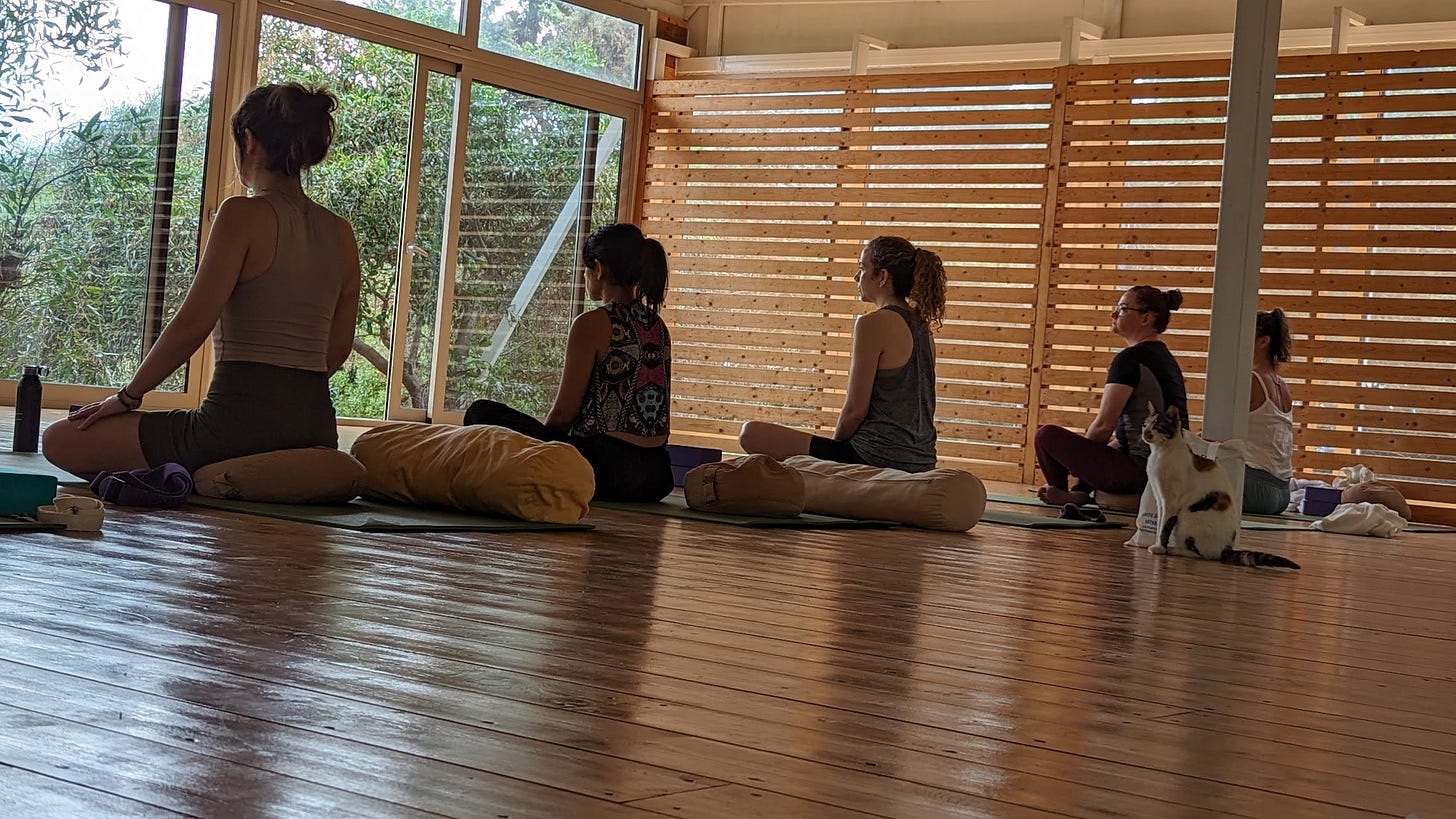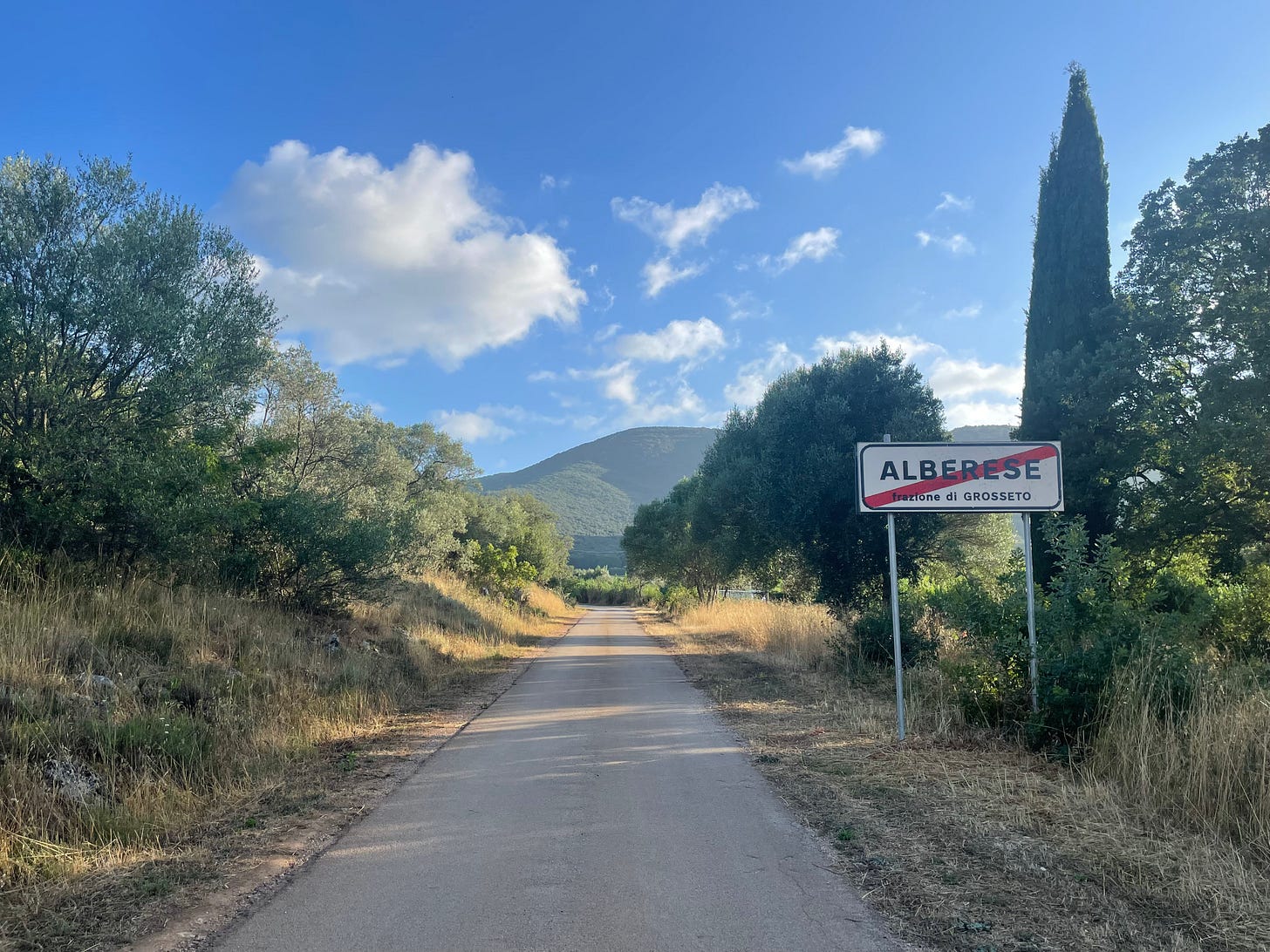The Artistic Desire To Be Taken Care Of
Limiting the energy we put into decision-making and our daily tasks can create the space we need to focus on our art.

Just over a week ago, I finished hosting my third writing and Yoga retreat, this time in Paros, Greece, with 17 inspiring, adventurous, kind, hardworking creatives. (It was absolutely lovely and I’m still processing much of what I learned as a human, a Yogi, and as a leader).
At one of our dinners early on in the week, a former stranger and now friend brought up how freeing it felt to not make decisions. On a retreat, the daily schedule is planned for you. The meals are served as a buffet of delicious food with lots of options, but you never need to peruse a menu and place an order. You don’t need to make your bed, do your dishes, or worry about if that Yoga class or writing workshop is worth the cost because it’s all included in what you paid in advance.
The rest of the table, myself included, immediately related. One woman shared that her partner often says he wishes he could support her financially. “If he just cooked dinner 3 times a week it would mean as much to me,” she said. Another woman laughed and chimed in, “Yeah, literally just make the bed instead.” Those of us grasping at minutes and hours to dedicate to our art in between other obligations understand how meaningful it is for somebody else to decide what’s for dinner and to prepare it. Or for your partner to tidy up the house so you can focus on your project.
Taking care of daily tasks and removing decisions from somebody is supporting them. Especially if they’re an artist searching for time to create.
This conversation helped clarify why retreating is so powerful. It also inspired me to reflect on how we can better organize our daily lives when we aren’t escaping our realities.
Can we evaluate our relationship to decision-making and chores to create more solitude and space in our lives at home?
Decision-making:
Think about how many decisions you make a day. From the moment you wake up, you begin making them: What will you eat for breakfast? When will you shower? Should you make coffee or grab one on the road? Is it a dog-park day or a walking day? When will you write? How much? Do you have time to journal? Which route will you take to work? Should you call your mom?
There is massive mental and emotional energy that goes into decision-making. We all know how exhausting it is to spend an hour discussing what to order for dinner or watch on Netflix before giving up and getting takeout from the same spot as usual or rewatching an episode of Friends. And those are just the inconsequential decisions we won’t remember in a week.
In Ruck Rubin’s The Creative Act, he writes:
Put the decision-making into the work, not into when to work. The more you reduce your daily life-maintenance tasks, the greater the bandwidth available for creative decisions. Albert Einstein wore the same thing daily: a gray suit. Erik Satie had seven identical outfits, one for each day of the week. Limit your practical choices to free your creative imagination.
After my retreat, I traveled with friends for a few days and immediately noticed the shift from making no personal decisions to constant personal decisions. At one point when deciding where to eat, I even said out loud: “I don’t have the energy to make this decision so I’m happy with whatever you pick.” Later in the trip, when we were deciding what to do with our day, one of them said: “Let’s remove the idea that we can make a wrong decision.” Oof. The weight of making the wrong decision is so heavy. Of course, there is no right or wrong, only the choice you make.
Limiting the energy we put into daily decision-making allows us to redirect it toward our art. In our daily lives, this might look like meal planning, creating a routine and sticking to it, or as Rick Rubin suggests, wearing the same thing every day. Or you may try giving yourself a dedicated week when you remove yourself from decision-making and let somebody else take the reigns. This could mean going on a retreat or saying to a partner, friend, or roommate: Hey, can you make this decision? I need a break.
Daily tasks:
In Henry David Thoreau’s Walden, he writes of the immense artistic and spiritual benefits of solitude and self-reliance. But perhaps he was able to so fruitfully create in the woods because his mom did his laundry. She also cooked and delivered him food throughout his stay at Walden, a property that she reportedly owned. (You can read more about that here!) Free from that labor, he focused on writing and thinking and creating. No wonder he wrote a book.
When our basic needs are taken care of, space emerges for our artistic self to flourish and blossom. It’s a precious gift to be cared for so that you can care for your art. (Just look at how mad men got when women were like, ok we wanna take care of ourselves now, can you make your own dinner?)
So how do we manage this in our own lives, in which the laundry and dishes and sweeping and tidying must be done, over and over and over? Perhaps you can create a schedule or routine for these tasks to be completed in a specific timeframe so you can free yourself up for your art. Perhaps some days are cleaning days, and others are writing days. If you live with somebody, make sure you delegate the chores you truly despise and claim the ones that bring joy. For me, cooking is a meditative art form. For my husband, it’s a stressful mess. He does the dishes, instead.
On retreating:
Do you ever find yourself wanting to get away and write? I do. And then I question: Is it actually easier to write at some cabin in a dreamy location? Why can’t I just do the same thing at home?
I believe it’s a matter of decisions and tasks. Sure, Thoreau got help from his mom. But even if we’re alone in a cabin in the mountains, our daily tasks are suddenly romanticized. I’ll cook dinner with wine and listen to music! I’ll do the dishes… while admiring the view! Our chores become less arduous, somehow reborn in a foreign place. Alone in a remote location, decisions are limited. Should I write or go for a walk? Good news, there’s time for both.
Now, after hosting a retreat for others, I’m on a solo writing retreat of my own, staying in a generous friend’s vacant apartment. Today is day two. I’ve created a routine I’m excited about. After being around people for weeks, I feel a renewed energy from solitude. Daily tasks that I can complete alone on my own time feel like a blessing. And I want to care for my friend’s home, who’s so graciously lending me a place to write.
It’s true that wherever you go, there you are. But it’s also true that getting away provides two key elements of creating: Solitude and space, which eventually, can bring clarity.







